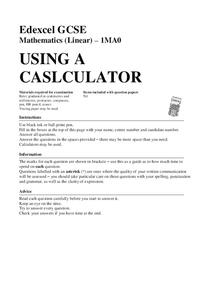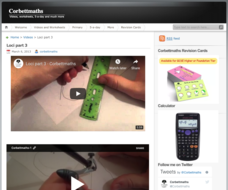Corbett Maths
Enlargements Using Ray Method
Figure out what to do when there is no grid to count. Using a ruler and a sharp pencil, the narrator shows how to perform a dilation when the figure is not on a grid. The ray method works by drawing a ray from the center of dilation...
Super Teacher Worksheets
Measuring With a Ruler
When it comes to using a ruler, how does your class measure up? Find out with this simple measurement worksheet that asks children to determine the lengths of common, everyday items to the nearest half inch.
EngageNY
Making Scale Drawings Using the Ratio Method
Is that drawn to scale? Capture the artistry of geometry using the ratio method to create dilations. Mathematicians use a center and ratio to create a scaled drawing. They then use a ruler and protractor to verify measurements.
National External Diploma Program Council
Measuring in Inches
Measure lines in inches using the most common tool of measurement: a ruler. Young mathematicians use a ruler to measure various lines. They also learn to round the the nearest quarter when measurements are not precise.
K-5 Math Teaching Resources
Elapsed Time Ruler Sample 1 x 4 Rulers
Who knew that you could measure time with a ruler? This great printable resource allows young mathematicians to visualize the hours of the day as they learn to calculate elapsed time.
Corbett Maths
Constructing SSS Triangles
Creating a triangles is as easy as 5, 6, 7. Using a ruler and compass to measure off lengths, a short video shows how to construct a triangle with three specific side lengths. The example creates a triangle with side lengths of 5 cm, 6...
Mathed Up!
Using a Calculator
Here's a video that presents several numerical expressions to be evaluated using a calculator.Viewers come to realize that sometimes it is not just a matter of punching in the numbers, but they also need to be concerned about how...
EngageNY
Making Scale Drawings Using the Parallel Method
How many ways can you create a dilation? Many! Individuals strengthen their understanding of dilations by using various methods to create them. The new technique builds on pupils' understanding of the ratio method. Using the ratio,...
Corbett Maths
Constructing SAS Triangles
Two sides and an angle ... a triangle it makes. Given the measure to two sides and the angle between them, the narrator of a short video shows how to draw a triangle with a ruler and protractor. Pupils use handouts to practice the newly...
National External Diploma Program Council
Measuring in Metrics
Practice measuring skills with a 10-question worksheet that challenges scholars to measure lines using centimeters and inches.
US Department of Commerce
Looking at Numbers of Births Using a Line Graph
Was there a baby boom? Using census data, class members take a look at the number of 8-11 year olds and determine their birth years. Scholars create a double line graph to compare the number of births for two states for several years....
Education.com
Measure School Supplies
Ever wonder how long a pair of scissors are? Find out with this simple measuring activity in which pupils use the provided ruler to determine the length of four common classroom supplies.
Curated OER
My Foot and the Standard Foot
Young mathematicians put one foot in front of the other as they learn how to measure length in an elementary math lesson. Using paper cutouts of their own feet, children measure classroom objects as they discover the importance of...
Mathed Up!
Compound Interest and Depreciation
Discover how to find the value of an interest-bearing account. Individuals watch a video to learn how to use exponential functions to model compound interest. After the video, they complete a instructional activity of problems on...
Mathed Up!
Circle Theorems
Explore theorems involving circles. Individuals watch a video that reviews the basic parts of a circle. They learn about circle theorems and compete a worksheet of problems that use these theorems — putting their skills to work right away!
Arizona Department of Education
Introduction to Integers
Welcome to the backward world of negative numbers. This introductory lesson teaches young mathematicians that negative numbers are simply the opposite of positive numbers as they use number lines to plot and compare...
EngageNY
The Distance from a Point to a Line
What is the fastest way to get from point A to line l? A straight perpendicular line! Learners use what they have learned in the previous lessons in this series and develop a formula for finding the shortest distance from...
Bowland
Soft Drinks
"Statistics are no substitute for judgment" - Henry Clay. Young mathematicians use provided statistics from a soda taste test to explain why conclusions are faulty. They devise a new test that would be more appropriate than the one given.
Corbett Maths
Loci Part 3
How do you use a scale drawing to find the region in a lake where a treasure is located? The narrator of a short video problem identifies three criteria to determine the location of the treasure. Using a compass and ruler, he determines...
EngageNY
Estimating Centers and Interpreting the Mean as a Balance Point
How do you balance a set of data? Using a ruler and some coins, learners determine whether the balance point is always in the middle. Through class and small group discussions, they find that the mean is the the best estimate of the...
Corbett Maths
Finding the Centre of Enlargement
Where did the transformation begin? Using a ruler, the narrator of a short presentation shows how to find the center of enlargement for transformed figures. Worksheets provide the class members an opportunity to practice the newly...
Math Mammoth
Measuring Length: Metric
In this mathematics activity, 3rd graders draw lines for each measurement. Then they measure the lines to the nearest centimeter. Students also use a ruler, a measuring tape, and measure small items and longer items.
EngageNY
The Mean as a Balance Point
It's a balancing act! Pupils balance pennies on a ruler to create a physical representation of a dot plot. The scholars then find the distances of the data points from the balance point, the mean.
EngageNY
Looking More Carefully at Parallel Lines
Can you prove it? Making assumptions in geometry is commonplace. This resource requires mathematicians to prove the parallel line postulate through constructions. Learners construct parallel lines with a 180-degree rotation and then...
Other popular searches
- Measuring Using a Ruler
- Using a Ruler Inches
- Measurement Using a Ruler
- Using a Ruler Activity
- Maths Using a Ruler
- Measurements Using a Ruler
- Measuring Using Ruler
- Measuring Length Using Ruler
- Math Using a Ruler























